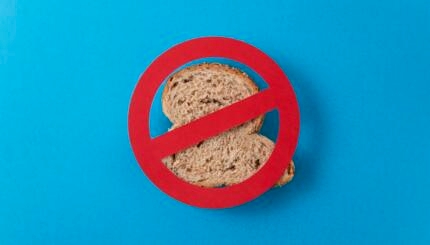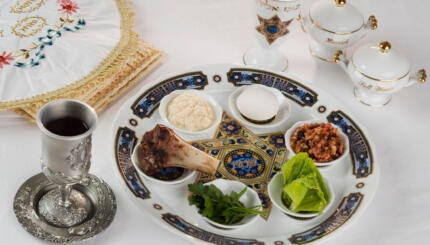If you’re a Jewish vegetarian, Passover can be a really trying time, health-wise. All of a sudden, you’ve got a lot fewer sources of protein, both from wheat products and, for those Ashkenazic vegetarians in the audience, beans and legumes.
From KatiBlack, one of our followers on our new Twitter feed, we got a link for VegCooking.com’s vegan and vegetarian Passover recipes. A lot of us are going to need this in the next few weeks — not just those vegans and vegetarians among us, but also anyone who gets sick of matzo brei and brisket after about 2 meals, and then realizes that we have seven and a half days left of Passover.
In some ways, the above link is really great. There’s traditional food, some modern twists, and a bit of variety. But VegCooking’s Passover reads like a menu consisting entirely of side orders, not meant to fill up anyone whose stomach is bigger than their fist — and it falls way short in the health arena. (The site, made by PETA, really should take itself more seriously, especially with an advertising budget as big as theirs.) VegCooking also doesn’t talk about what to do instead of a shankbone on the seder plate. Fortunately, however, we’ve got a solution for you.
VegCooking’s failings made me wonder what alternatives were out there. Recipezaar has some cool recipes — especially half-sour pickles — but you can tell it’s not a site made by people who know about kosher cooking. For one thing, it has a bunch of stuff that isn’t universally kosher for Passover, and nowhere does it warn that, for instance, no Ashkenazic Jew would ever eat lentils on Passover.
If you are Sephardic, however, you’ve got to check out VegKitchen.com. I’ve never done Passover this way, but the recipes look amazing, and a bunch of my Sephardic Facebook friends swear by her.
One of the best resources (and with some great writing) are the brief-but-thorough entries on The Chocolate Lady‘s blog, which goes through an encyclopedic list of vegetables and other foods, and includes some bonus recipes. (Plantains! Plantain chips! Now this is a Passover to dream about.)
Back to nutrition, though. “It’s all about almonds, walnuts, and pumpkin seeds,” says Sarah Chandler, a practicing vegan and the webmaster of JewSchool. Pumpkin seeds especially — they have amazing stores of iron and protein. (Here’s a complete chart, just in case you’re wondering.) But vegetables are also a good source of protein — “Even one cup of broccoli has a good deal of protein in it,” notes Chandler.
Other good, solid bets for Passover food include:
* Plantains! Plantains look like bananas, although they sometimes look spoiled or bruised. They’re not! That’s just how plantains grow. Take it as a warning not to eat them raw — they’re starchy and thick, and they taste like biting into thick dough. Fried, however, they’re bloody amazing. You can make them sweet (cinnamon, nutmeg) or savory (salt, pepper, paprika) and it’s like two entirely different foods. You know that amazing smell that always hits you walking past Latin American restaurants? A lot of that comes from plantains.
* Wheatgrass! OK, I’m not a big wheatgrass fan. It’s not actually made of wheat (it’s not exactly grass, either, though the similarity is disturbing), and therefore, it’s 100% kosher for Passover.
* Quinoa! is a great underused food, not just for Passover (and not just for vegetarians) but for pretty much everyone, all the time. It feels like couscous, tastes like whatever you spice it with (it’s really good at absorbing flavor) — but it’s actually a tuber, a distant cousin of the potato. (It’s also loaded with vitamins and protein.) It comes from South America, so no ancient rabbis ever thought to outlaw it. Today, there’s a big question among observant Jews about whether or not quinoa’s allowed on Passover, but Rabbi Avrohom Blumenkrantz, who basically wrote the rulebook on Passover food, says that it’s impossible to forbid it outright — and that many people have a custom of not eating quinoa just because it’s so weird, but for vegetarians and anyone else who’s conscious of their health, you not only can eat it, but you should eat it.
My personal favorite technique for Passover is to make normal food. Uh, whut? Pretend it’s not Passover — just cook without wheat or grain. A really good tomato soup (basil! leeks!) is an awesome meal that’s totally kosher for Passover as long as you don’t remind yourself; MJL’s beet and potato frittata was made to be a light and fluffy post-Yom Kippur fast meal, but light & fluffy is exactly on the menu for someone who’s just made it through two seders.
And, if you needed a reason to go vegetarian, this supplies it: In the midst of my complaining about VegCooking, I found a tiny link that sent me to a tiny 3-minute documentary that shows the horrors that went on at Rubashkin’s. I know it’s old — but I’d never actually seen the footage before, of a kashrut inspector cutting open a cow and then someone right behind him yanking out the cow’s trachea. And now I think I’m more freaked than ever.
kashrut
Pronounced: kahsh-ROOT, Origin: Hebrew, the Jewish dietary laws.
kosher
Pronounced: KOH-sher, Origin: Hebrew, adhering to kashrut, the traditional Jewish dietary laws.
seder
Pronounced: SAY-der, Origin: Hebrew, literally "order"; usually used to describe the ceremonial meal and telling of the Passover story on the first two nights of Passover. (In Israel, Jews have a seder only on the first night of Passover.)
Sephardic
Pronounced: seh-FAR-dik, Origin: Hebrew, describing Jews descending from the Jews of Spain.


